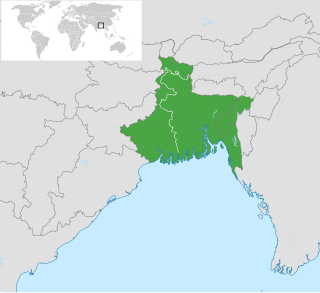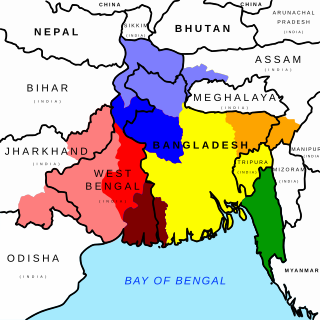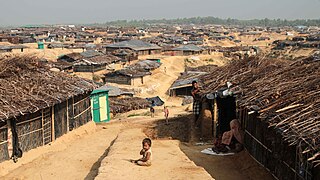The UN estimates that there are around 2.1 million immigrants in Bangladesh as of 2020, roughly half of which are Rohingya refugees. [1]
The UN estimates that there are around 2.1 million immigrants in Bangladesh as of 2020, roughly half of which are Rohingya refugees. [1]
Bengal was historically one of the most immigrated-to regions of the Indian subcontinent, with the Bengali people having a significant ethnic admixture of several groups. Several invasions coming through northwestern India contributed to Bengal's demographics. [2]
Some people internally migrated to Bangladesh from Pakistan before the 1971 split of the two countries. Afterwards, some of these "stranded Pakistanis", often known as "Biharis", ended up in refugee camps in Bangladesh, with only 200,000 of them (less than half) taken back by Pakistan after the 1973 Delhi Agreement. [3]
Rohingya refugees have come to Bangladesh in significant numbers due to conflicts in Myanmar. [4]

Bangladesh is the eighth-most populated country in the world with almost 2.2% of the world's population. As per the final results of the 2022 Census of Bangladesh, the country's population is 169,828,911. Bangladesh has one of the highest population densities in the world.

Cox's Bazar is a district in the Chittagong Division of Bangladesh. It is named after Cox's Bazar town. It is located 150 kilometres (93 mi) south of Chittagong. Cox's Bazar is also known by the names Panowa and Palongkee. The modern Cox's Bazar derives its name from Captain Hiram Cox, an army officer who served in British India. It is one of the fishing ports of Bangladesh, and contains one of the world's longest natural sea beaches.

Religious segregation is the separation of people according to their religion. The term has been applied to cases of religious-based segregation which occurs as a social phenomenon, as well as segregation which arises from laws, whether they are explicit or implicit.

Islam is the largest and the state religion of the People's Republic of Bangladesh. According to the 2022 census, Bangladesh had a population of about 150 million Muslims, or 91.04% of its total population of 165 million. Muslims of Bangladesh are predominant native Bengali Muslims. The majority of Bangladeshis are Sunni, and follow the Hanafi school of fiqh. Bangladesh is a de facto secular country.

The Rohingya people are a stateless ethnic group who predominantly follow Islam and reside in Rakhine State, Myanmar. Before the Rohingya genocide in 2017, when over 740,000 fled to Bangladesh, an estimated 1.4 million Rohingya lived in Myanmar. Described by journalists and news outlets as one of the most persecuted minorities in the world, the Rohingya are denied citizenship under the 1982 Myanmar nationality law. There are also restrictions on their freedom of movement, access to state education and civil service jobs. The legal conditions faced by the Rohingya in Myanmar have been compared to apartheid by some academics, analysts and political figures, including Nobel laureate Bishop Desmond Tutu, a South African anti-apartheid activist. The most recent mass displacement of Rohingya in 2017 led the International Criminal Court to investigate crimes against humanity, and the International Court of Justice to investigate genocide.

Hinduism is the fourth-largest religion in Myanmar, being practised by 1.7% of the population of Myanmar. Hinduism is practised by about 890,000 people in Myanmar, and has been influenced by elements of Buddhism, with many Hindu temples in Myanmar housing statues of the Buddha. There is a sizable population of Hindus with the Myanmar Tamils and minority Bengali Hindus having the biggest population share.

Hinduism is the second largest religion in Bangladesh, as according to the 2022 Census of Bangladesh, approximately 13.1 million people responded that they were Hindus, constituting 7.95% out of the total population of 165.15 million people. In terms of population, Bangladesh is the third-largest Hindu populated country of the world, after the neighboring countries of India and Nepal. Hinduism is the second-largest religion in 61 out of 64 districts of Bangladesh, but there is no Hindu majority district in Bangladesh.

Since its independence in 1947, India has accepted various groups of refugees from neighbouring countries, including partition refugees from former British Indian territories that now constitute Pakistan and Bangladesh, Tibetan refugees that arrived in 1959, Chakma refugees from present day Bangladesh in early 1960s, other Bangladeshi refugees in 1965 and 1971, Sri Lankan Tamil refugees from the 1980s and most recently Rohingya refugees from Myanmar. In 1992, India was seen to be hosting 400,000 refugees from eight countries. According to records with the Union Ministry of Home Affairs, as on January 1,2021, there were 58,843 Sri Lankan refugees staying in 108 refugee camps in Tamil Nadu and 54 in Odisha and 72,312 Tibetan refugees have been living in India.
East Bengali Refugees are people who left East Bengal following the Partition of Bengal, which was part of the Independence of India and Pakistan in 1947. An overwhelming majority of these refugees and immigrants were Bengali Hindus. During the Bangladesh liberation war with West Pakistan, an estimated ten million people of East Pakistan fled the country and took refuge in India particularly in the Indian states of West Bengal and Indian North East region, especially Tripura and Assam.
The United Nations categorizes Bangladesh as a moderate democratic Muslim country. Sunni Islam is the largest religion in the country and in all of its districts, except Rangamati. The Constitution of Bangladesh refers to Islam twice: the document begins with the Islamic phrase Bismillahir Rahmanir Raheem and article (2A), added later, declares that: "Islam is the state religion of the republic".

The nationality law of Bangladesh governs the issues of citizenship and nationality of the People's Republic of Bangladesh. The law regulates the nationality and citizenship status of all people who live in Bangladesh as well as all people who are of Bangladeshi descent. It allows the children of expatriates, foreigners as well as residents in Bangladesh to examine their citizenship status and if necessary, apply for and obtain citizenship of Bangladesh.

Immigration to Pakistan is the legal entry and settlement of foreign nationals in Pakistan. Immigration policy is overseen by the Interior Minister of Pakistan through the Directorate General Passports. Most immigrants are not eligible for citizenship or permanent residency, unless they are married to a Pakistani citizen or a Commonwealth citizen who has invested a minimum of PKR 5 million in the local economy.
Rohingya people in Pakistan are a community based in Karachi, Sindh, Pakistan. They are Rohingya Muslims, an ethnic group native to Rakhine State, Myanmar, who have fled their homeland because of the persecution of Muslims by the Burmese government and Buddhist majority. According to varied Pakistani government sources and the Arakan Historical Society, there are some 200,000 Rohingya refugees residing in Pakistan. All of them have made a perilous journey across Bangladesh and India and have settled in Karachi. A report on human trafficking stated that Burmese people make up fourteen per cent of Karachi's undocumented immigrants. Large scale Rohingya migration to Karachi made Karachi one of the largest population centres of Rohingyas in the world after Myanmar. In the recent years, scores of Burmese women seeking employment have entered the country. Different resources cite the number of these women to be in the thousands.

Greater Bangladesh, or Greater Bengal is an irredentist ideology that wishes for Bangladesh to expand its territory to include the Indian states that currently has, or historically had, large populations of ethnic Bengali people. These include West Bengal, Bihar, Odisha, and Jharkhand to the west, Sikkim to the north, and the states of Arunachal Pradesh, Assam, Meghalaya, Tripura, Mizoram, Manipur, and Nagaland to the east.

Bangladeshis are the citizens of Bangladesh, a South Asian country centred on the transnational historical region of Bengal along the eponymous bay.

The Rohingya conflict is an ongoing conflict in the northern part of Myanmar's Rakhine State, characterised by sectarian violence between the Rohingya Muslim and Rakhine Buddhist communities, a military crackdown on Rohingya civilians by Myanmar's security forces, and militant attacks by Rohingya insurgents in Buthidaung, Maungdaw, and Rathedaung Townships, which border Bangladesh.

In 2015, hundreds of thousands of Rohingya people were forcibly displaced from their villages and IDP camps in Rakhine State, Myanmar, due to sectarian violence. Nearly one million fled to neighbouring Bangladesh and some travelled to Southeast Asian countries including Malaysia, Indonesia, Cambodia, Laos and Thailand by rickety boats via the waters of the Strait of Malacca, Bay of Bengal and the Andaman Sea.
A refugee crisis can refer to difficulties and dangerous situations in the reception of large groups of forcibly displaced persons. These could be either internally displaced, refugees, asylum seekers or any other huge groups of migrants.
An illegal immigrant in India is a foreigner who has entered India either without valid documents or who initially had a valid document, but has overstayed beyond the permitted time, as per the general provisions of the Citizenship Act as amended in 2003. Such persons are not eligible for citizenship by registration or naturalisation. They are also liable to be imprisoned for 2–8 years and fined.
The Citizenship (Amendment) Act, 2019 (CAA) was passed by the Parliament of India on 11 December 2019. It amended the Citizenship Act, 1955 by providing an accelerated pathway to Indian citizenship for persecuted religious minorities from Afghanistan, Bangladesh and Pakistan who arrived in India by 2014. The eligible minorities were stated as Hindus, Sikhs, Buddhists, Jains, Parsis or Christians. The law does not grant such eligibility to Muslims from these countries. Additionally, the act excludes 58,000 Sri Lankan Tamil refugees, who have lived in India since the 1980s. The act was the first time that religion had been overtly used as a criterion for citizenship under Indian law, and it attracted global criticism.